|
|
Chapter Fourteen: Wedding Bells (1986)
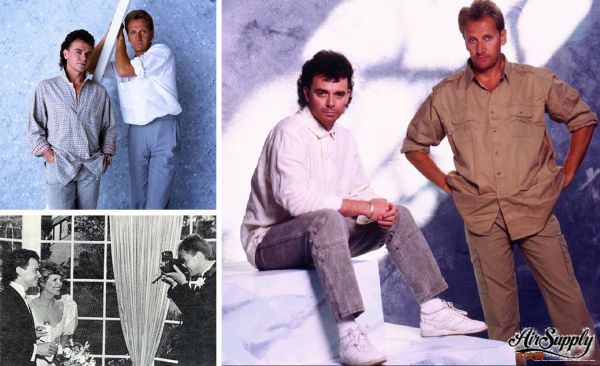
Graham and Russell hoped to spend less time on the road in 1986 so they could work on personal projects, but their contract with Arista forced them back into the studio. Clive Davis knew the risks involved when band members express a desire to work on solo material. “I always worry when, between band projects, the individual members go off and do their own thing,” he said. “I understand the impulse to work outside the format of the band and spread your creative wings, but with the rare exception, solo excursions don’t do as well, and then the band has to scramble to come up with an album’s worth of material.”
Russell and Paula were married on February 15, with Graham acting as best man. The wedding took place at the Bel Air Hotel in Los Angeles and was attended by 150 guests including Clive Davis and Priscilla Presley. Russell and Paula had become good friends with Priscilla Presley after they were introduced by Australian artist Brett-Livingstone Strong. The newlyweds moved into Russell’s suburban Los Angeles home, and postponed the honeymoon so that Russell could get back into the studio and work on the new album. Russell enjoyed his time being single and took full advantage of all the perks being a rock star provided, but he knew it was time to settle down. The days of crazy after-show parties were over. “We are not nineteen or twenty anymore you know,” said Russell. “I went through all that eight years ago. It was fun to be promiscuous but that all catches up with you and then it just gets boring. One of the fun things about marrying somebody or having a serious relationship is the chase and the courtship. If you open the backstage door and five girls are there saying ‘step into my office,’ it’s no fun you know. All that stuff gets tiring very quickly unless you have the mentality of some of the people in this business who like to bolster their ego. In the eleven years that Air Supply has been together, we have seen and done it all. But now our focus is on the right things, like family and keeping in shape.”
On April 1, Graham and Russell performed at the 4th Annual Miss Hawaiian Tropic International Beauty Pageant. The two-hour special was taped in Honolulu, and was syndicated nationally and internationally on April 11. The duo previewed a new song, ‘Stars In Your Eyes,’ from their forthcoming album. “I really wanted to be a judge,” joked Russell, “but my wife said ‘No way,’ because according to her I’m at that dangerous age when all women look alike...desirable.”
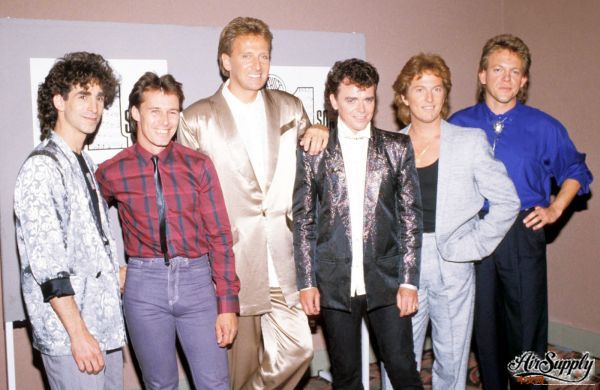
(L-R) Greg, Ralph, Graham, Russell, Don, Robin
Longtime keyboardist Frank Esler-Smith left Air Supply. His departure was a shock to the band and a potentially serious blow from an artistic perspective. “We were surprised when Frank quit,” said Graham. “He’d been with us for ten years. He wanted to stay in Australia. But it worked out for the best. We went ahead and made a few other changes at the same time. It was good to get a bit of fresh blood.”
In May, Ken Rarick and Wally Stocker quit the band too. Rarick’s tenure in Air Supply was much longer than he had anticipated. After getting married in October of 1983, he agreed to stay for just two tours plus a recording session in the Caribbean. “I certainly don’t want to tour forever,” he said. “We are very interested in having a family and I don’t want to be an absentee father.” Wally Stocker joined the English rock band Humble Pie. Rarick and Esler-Smith were replaced by Robin Swensen and Greg ‘Harpo’ Hilfman. Replacing Wally Stocker was Los Angeles-based session guitarist Tim Godwin. Don Cromwell and Ralph Cooper remained with the band. “The new members are basically studio players who wanted to go out on the road and see how the other half lives,” said Graham.
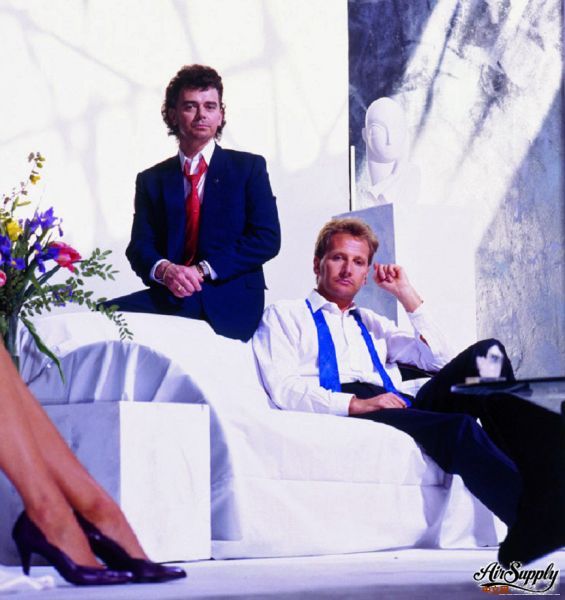
Graham and Russell had a specific vision for the new album. They wanted to bring back the harmonies and powerful strings, which had been a staple in their successful early recordings. To make this happen, a considerable amount of the albums recording budget was spent on hiring two successful producers, Bernard Edwards (former Chic bassist) and John Boylan.
Bernard Edwards, a highly respected producer, having worked on successful albums for Duran Duran, Power Station and Robert Palmer, produced most of Air Supply’s new album. “When we told the guy who represents us that we were doing another album he suggested that we get in touch with Bernard,” said Russell. “And it all sort of came about from there. We were surprised at first. But it was a real pleasure to work with him.” Edwards was granted full artistic control provided he was able to bring back some of the band’s former sound, but with a tougher edge. He used session musicians rather than the band members in Air Supply. These session players were some of the finest in the world, including Power Station drummer Tony Thompson, guitarist Eddie Martinez (noted for his work with Mick Jagger and Run D.M.C.), and keyboardist Jeff Bova from Herbie Hancock’s band. Bernard Edwards, regarded as one of the most important bass players of the 20th century, played bass. Edwards and Thompson were perhaps the funkiest, most stylish rhythm section of the 80s. “We were after a certain sound and it was up to them to give it to us,” said Graham. “We let them use the people they wanted. The session players really wanted to test their skills in our vein of music. And they got into it to an incredible degree.” In the end, Edwards felt he was able to produce the sort of sound they were looking for: “Russell and Graham wanted a little more edge to their sound and some funky rhythms, and I gave it to them.”
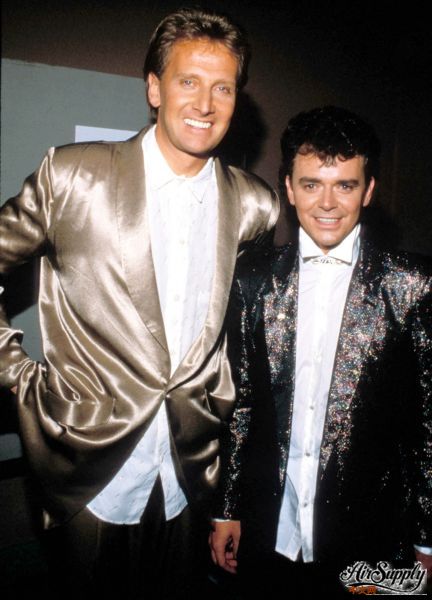
Clive Davis and John Boylan produced two tracks for the new album, ‘Lonely Is The Night’ and ‘One More Chance.’ Bolan was best known for his work on hit albums from Boston, the Little River Band, and Linda Ronstadt. Bolan, like Bernard Edwards, was careful to give Air Supply the sound they wanted, while staying true to their own musical tastes. He used established session players, including guitarist Michael Landau, keyboardist John Capek, and percussionist Michael Botts. “Even though [Bolan’s] an old friend,” said Russell, “we’ve never had the opportunity to work together before. It was a real treat. We used real strings again. Lots of dual vocals and the rest is practically ‘au natural.’ The emphasis is on the rhythm section and natural-sounding instruments. Making [this] album is going to cost close to $1 million before we get money back from it.”
On June 7, Graham and 21-year-old Jodi Varble were married in Jodi’s hometown of Rockford, Illinois. Russell was the best man and sang ‘Now and Forever’ during the ceremony. Immediately following the wedding, the newlyweds flew to Australia for a second wedding ceremony to accommodate Graham’s extended family. “They were completely different weddings so it was new each time,” said Jodi. “We just decided it would be more convenient to have two.” The newlyweds moved into a beautiful home in Malibu, which they eventually shared with several dogs.
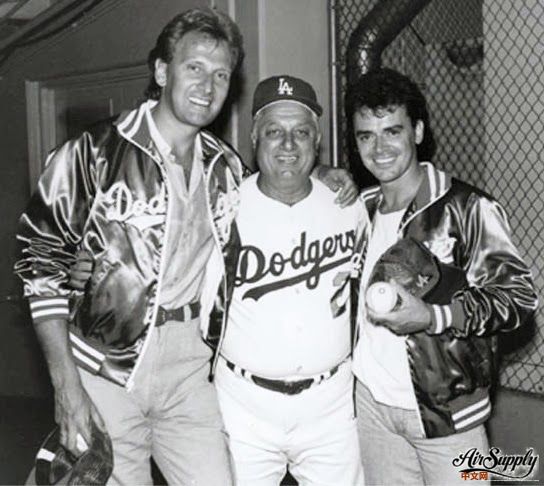
Air Supply with Tommy Lasorda - July 11, 1986
On July 11, Graham and Russell sang the National Anthem before the nationally televised Los Angeles Dodgers vs. Chicago Cubs game. It was an exciting occasion for the duo from Australia; not only did they pay tribute to their new homeland (both recently relocated to Southern California), but also to fellow Aussie and Dodger infielder, Craig Shipley, who is a native of Sydney, Australia. Shipley was only the second major league player in baseball history to originally come from Australia.
Air Supply planned an American tour in support of the new album, starting on July 30 with a concert in Kansas City, and lasting three months. “We’ve cut down drastically on the touring,” said Graham. “It’s more exciting this way because we’re not going out there blind from playing shows all the time. We’re picking our shows now and it used to be that we’d play anywhere they’d pay us for playing. We’re fussier now and there are certain countries we won’t go to.” Russell was confident the band could function and continue to tour despite the changes in their personal lives: “My wife is a flight attendant so she has a lot of flexible time. If I give her enough notice, she can plan to be out next month for four or five trips. Graham’s wife is a model so she has a lot of flexible time as well. It makes us perform better because we are happy in ourselves, and they are happy because they can see a lot of us. Plus, they are not wondering what we are doing or who we are with.”
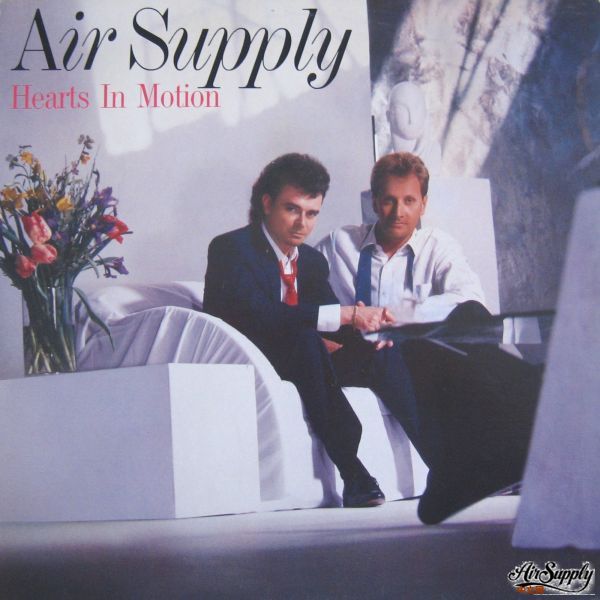
The forthcoming album’s lead single, ‘Lonely Is The Night,’ was released July 23. It was written by Albert Hammond and Diane Warren, and was hand-picked by Clive Davis. It made sense to pair Warren with Air Supply because she was already an established writer of romantic music. Her first big hit, called ‘Solitaire,’ was written in 1983 for Laura Branigan. But it was her next hit that brought her major attention: DeBarge’s ‘Rhythm Of The Night.’ At one point, she had seven songs by seven different artists on the chart, and had the top two as well.
“By this time, I had forged a close relationship with Diane Warren,” said Clive Davis, “a songwriter whose career was really heating up. She would come to see me a the Beverly Hills Hotel, open up a big bag filled with cassettes, and play song after song for me, so intensely and with so much nervous energy that you would think her life literally depended on what I thought. Diane lives, breathes, is consumed by music. I’m not entirely certain if she ever sleeps. She’s extremely prolific, and her percentage of exceptional songs is very high. I would listen to song after song, each once preceded and followed-and often interrupted-by her breathless questions. ‘Do you love it? Is this not the best I’ve every written?’ She would practically be hyperventilating. Most of the time, she’d mention Whitney, which was understandable. No one was bigger, and getting a song placed on a Whitney album was a coveted achievement.”
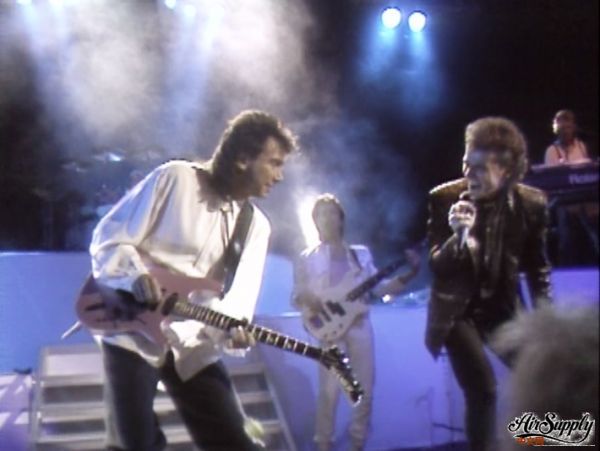
'Lonely Is The Night' Video Shoot
Neither Graham or Russell liked ‘Lonely Is The Night,’ and initially were not happy it was included on the album. The decision to release it as the first single only increased their frustration. “When we did this song I was never totally into it,” said Graham. “I didn’t feel it was strong enough, but many people did. It was during a strange time in our career. The record company picks the songs to release as singles. It’s not the one I would have picked.”
Four weeks after its release, ‘Lonely Is The Night’ reached a high of #78 on Billboard. “I guess radio didn’t seem to want to play Air Supply at the time or they didn’t like the song or the record,” said Diane Warren. “In other words... it didn’t happen.” VH-1 aired a promotional music video of the single, which was one of two songs that Air Supply filmed on the same day during their summer tour of the States. The live performance videos were directed and produced by John B. House, and shot by Rock Solid Productions with two Betacam cameras at L.A.’s art-deco landmark, the Beverly Theatre. “They advertised that is was going to be a video shoot so there was a lot of fans there screaming and waving flowers,” recalls Russell. “There was ‘Lonely Is The Night’ and ‘One More Chance’ that was done on the same stage, but I think we changed shirts,” laughed Graham.
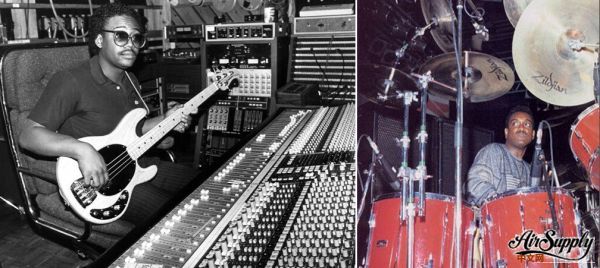
Bernard Edwards (Left) & Tony Thompson
The album ‘Hearts In Motion’ was released worldwide on August 12. The album cover was the first since ‘The One That You Love’ to use a different typeface for the band’s name, perhaps an attempt to show that Air Supply was moving in a new direction. Musically, the album was much different than anything Air Supply had done in the past. Many of the tracks were built upon the heavy drum beats of Tony Thompson, and the prominent basslines of Bernard Edwards similar to those he contributed to Power Station’s self-titled 1985 album. “It’s a lot more of a tougher sound,” said Russell. “In a way we got back to basics because there’s a lot more of Graham and I singing on this record than the last one. Basically, in the last three or four [records] we were making the same sounding albums. I was always happy with the results at the time, but you always think there’s something you can do a bit different or better. I guess after the last album we wanted to get a sound with a little more high tech to it. I think this will open us up to people who have never heard our music before.”
“When the music scene changes,” said Clive Davis, “you can’t be content with just doing more of what you’ve been doing all along, however good you may be at it. You can’t just relive your former glory. That’s the hardest thing for executives, even very creative executives, to understand. For that matter, it’s the hardest thing for artists to understand. You’ve got to know when you’ve got to build for the future. You can’t just look in the mirror and see the embodiment of all the chart success and positive reviews you’ve gotten. You have to see yourself and the market as objectively as possible, as hard as that can be in a field as subjective as music. Your own taste is not the issue. At every moment you have to ask yourself, Is music changing? Is radio changing? What was a hit five years ago might no longer be a hit today. Music is always evolving, and it’s essential to understand how and when it does, and what you need to do about it.”
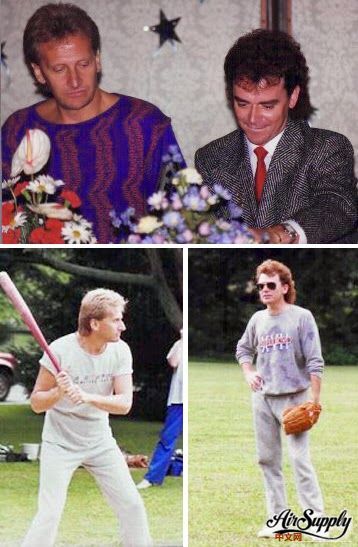
Fan Club Activities
The inaugural North American Air Supply fan club gathering took place on August 11-12, in Philadelphia. It was an exciting time for fans because the band was in the midst of their summer tour and ‘Hearts In Motion’ had just hit record store shelves. The event started with a dinner at the Dunfey City Line Hotel where fans interacted with the band. The following day, a softball game was played in a nearby park and featured fans versus band members. The fan club gathering concluded that evening with a live Air Supply performance.
‘Hearts In Motion’ got mixed reviews. Some critics felt the band had gone to the well once too often with the same old love songs:
‘Hearts In Motion’ offers nothing really new. The songs are still loaded with romantic, cliche-ridden lyrics about loves lost, loves current and anticipation of future loves. If it weren’t for love, Graham and Russell would have nothing to sing about. One of the album’s best cuts is a remake of the Albert Hammond-Dianne Warren song ‘Lonely Is The Night,’ though songs like ‘It’s Not Too Late’ and ‘One More Chance’ could score well on the charts as well. - Deseret News, Salt Lake City, Utah
Australian pop duo of Russell Hitchcock and Graham Russell have been a dominant force among adult contemporary artists. ‘Hearts In Motion’ is a solid outing and promises to extend their hot streak, with ‘My Heart’s With You,’ ‘Lonely Is The Night’ and ‘Stars In Your Eyes’ particularly noteworthy offerings. - Billboard
Graham and Russell were at a point in their careers where they were not about to make drastic changes to satisfy a few critics. “We did it because we liked it,” said Graham. “We certainly did not do it for financial reasons. We had made enough money, so if we didn’t want to be doing it, we wouldn’t have.”
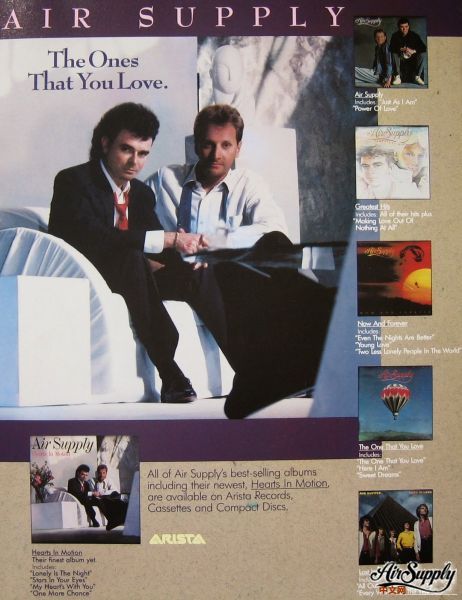
‘Hearts In Motion’ Advertisement
The tour of 1986 was labeled ‘In Motion Tour ’86’ and featured similar lighting and effects to the previous tour. The band changed their onstage image, moving towards a sophisticated and elegant look, reminiscent of the ‘New Romantic Fashion’ made popular by such bands as Spandau Ballet, ABC and Duran Duran. The tour focused mostly on Graham and Russell up front, with the band taking a backseat compared to 1985’s ‘Power Of Love’ tour. The band played loud, but rarely got a chance to strut their stuff, except for the obligatory drum solo from Ralph Cooper and a few guitar riffs from Tim Godwin. The focus was clearly on Russell’s clear tenor, which commanded the spotlight most nights.
The summer tour across the U.S. and Canada was considered a success. The only setbacks were a broken-down tour bus, and the cancellation of a show in Atlanta, because Russell’s tonsils were swollen and was under doctor’s orders not to sing or use his voice. Guitarist Tim Godwin described the bus incident; “We were in Detroit playing Pine Knob Amphitheatre [on August 7]. It was hot and humid and it was my birthday. We played a show that night, and the next day was a travel day. Which meant no matter what happened that night we could all sleep on the bus to the next city. My buds DC and Robin were up to showing me a good time. ‘We are going to party all night’ were the words told to me after the show. Ralph and Harpo hung in for a bit, but they knew better. They had a few drinks and were off to their rooms for a good night sleep. So needless to say, we stayed up till about 5 a.m.. Since we had a 7 a.m. lobby call, that gave us time to shower, pack and get on the bus. About twenty minutes into what I believe was some of the best and deepest sleep that I had had in a long time, was suddenly interrupted by a loud banging sound and jolt that nearly threw me out of my bunk. The bus veered to the side of the road. The drive shaft had snapped in two. Now these aren’t the type of buses that you pick up at Avis. So a call was made for some type of vehicle to come pick us up. We needed something big enough to carry eight people, some luggage and guitars. Of coarse that would be an all-window passenger van. We were packed like sardines, with our sunglasses on and leaning on each other for six hours.”
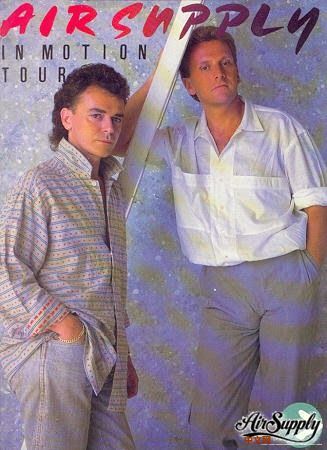
1986 Tour Book
Music critics were pleasantly surprised with Air Supply’s three-month summer tour. Critics who quickly slammed the band in years past now provided a more thoughtful critique:
Even though the sentiments remain treacly, the attack has toughened, and Air Supply has learned how to pace itself. While they featured their classics - ‘Lost In Love,’ ‘All Out Of Love’ and ‘I Can Wait Forever,’ they sharpened their attitude and playing, particularly in the second set, which featured four new tunes from their new, and most listenable, album. Hitchcock continued to astonish with his versatile, expressive voice, and Russell simply proved he should sing more, and be less of a wallflower. On their new tunes, particularly the hard-rocking ‘Put Love In Your Life’ and their current single, ‘Lonely Is The Night,’ the seven-men strong band effectively blasted an audience that in the past might have come to be sedated. - Schenectady Gazette, Schenectady, New York
In concert, Air Supply opted for a more rhythmic beat, especially on tunes such as ‘Even The Nights Are Better’ and ‘Time For Love,’ off its new album. While the band relies heavily on a synthesizer-oriented approach to its fluff-pop, the group took on a funky edge with its new material. - The Milwaukee Sentinel
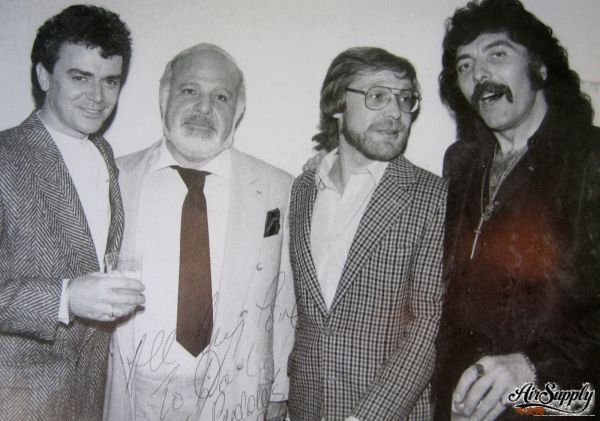
(L-R) Russell, Don Arden, David Arden, Tony Iommi
Air Supply manager Don Arden found himself in serious legal trouble in 1985 when he and his son, David, were charged by British authorities with assault on Harshad Patel, an accountant working for Jet Records. Remarkably, Arden did not have a criminal record, but this accusation was considered very serious. The charges included kidnapping, blackmail, torture and assault. Arden was arrested on the charge in Los Angeles in October of 1985, and remained free on $175,000 bond pending completion of extradition proceedings. He voluntarily returned to London for a long and drawn-out court case. It was one of the most dramatic court cases in pop history, and also one of the most expensive.
To help pay for the legal proceedings, Jet Records pleaded for money from the bands they represented. Black Sabbath guitarist Tony Iommi wrote about these events in his 2012 book titled Iron Man: My Journey Through Heaven and Hell With Black Sabbath; “I was asked to help [Arden] out, just like the other band that he managed, Air Supply. His lawyer said to me, ‘Look, Don’s in a lot of trouble. We need to help him out otherwise he’s going to die in that jail, he’s never going to be able to stand it. We’ve got three hundred grand off Air Supply. Could you put some money in as well? You‘ll get it back. We’ll draw up these papers and everything will be sorted.’ So I did. I put fifty or sixty grand in. Never got it back, of course, and neither did Air Supply as far as I know. Suddenly all the papers we had signed got lost. What a mess. In the end somebody had to go to jail and Don’s son, David, got incarcerated instead of his father. David basically covered for Don and did the time.”
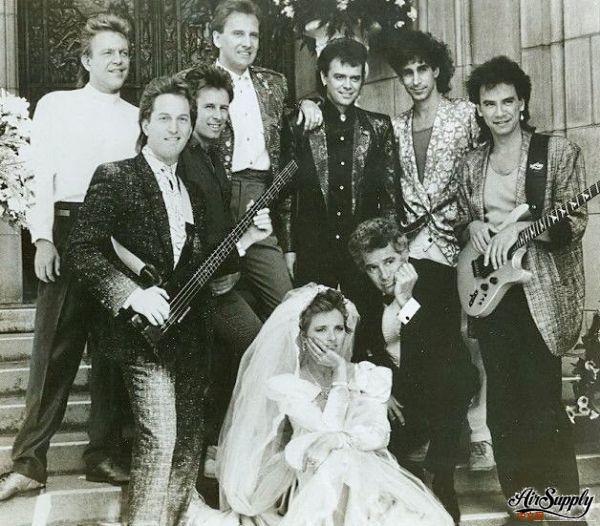
Air Supply on TV Soap Santa Barbara
In 1993, Arden sold Jet Records and all his publishing interests for $40 million. He was 67 years old and decided it was time to close down the store. “When you go with the best lawyers they want the most money,” said Arden. “So it was rather hurtful. They say that every empire must one day crumble and fall. And so it was with me in the late eighties. I had already begun selling off various parts of the business. I had also ditched Sabbath and then Air Supply and one or two other projects. In truth, by the mid-eighties I suppose I was simply getting bored with the whole business. Did I take my eye off the ball, though? Yes, I suppose I did. Often I would leave David to run the L.A. office while I went off on another trip. After so many years spent working, fighting, clawing my way to the top, the truth is I simply couldn’t be bothered with it anymore. There had to be more to life.”
Russell’s desire to return to acting was realized, albeit briefly, when he and the rest of Air Supply appeared on NBC’s daytime drama Santa Barbara. Taking time out from their current concert tour, Air Supply were invited to star in three episodes written especially for them. Portraying themselves, Graham and Russell became entangled with the show’s villainous Gina Capwell en route to C.C. Capwell’s wedding, shot on location at a Gothic cathedral in downtown Los Angeles. Air Supply performed three songs: ‘Stars In Your Eyes,’ ‘Black and Blue’ and ‘Sweet Dreams.’ The shows aired November 12-14. “We did Santa Barbara and actually had lines, but it was dreadful,” laughed Russell. “Daytime dramas are what life’s really all about: chaotic descents into backstabbing and shattered romance.”
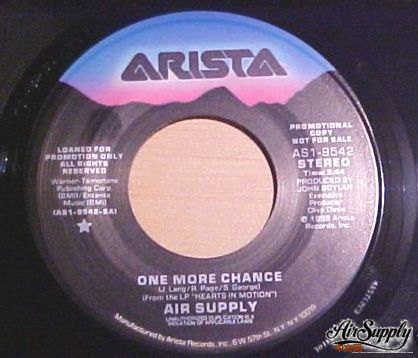
'One More Chance' - U.S.
‘Hearts In Motion’ was not exactly flying off record store shelves, so choosing the next single was of the utmost importance. In October, Arista released ‘One More Chance’ (AS1-9542). It was written by Richard Page, John Lang and Steve George of the band Mr. Mister. It was the fifth consecutive single to be written by someone other than Graham, who believed that either ‘Stars In Your Eyes’ or ‘Put Love In Your Life’ would have been a better choice. “We always got a tremendous reaction to ‘Stars In Your Eyes’ on the road,” he said. “After doing this as long as we have, it’s difficult to get something that really knocks your socks off. But that song did it for me. It wasn’t that we were tired of the ballads. We wanted people to see another side of us as well. We were capable of doing other things. That was the beginning of us realizing that we weren’t in control of our careers. Our hands were tied. It’s the same old corporate thing with all record companies. They find something that works and then they do it to death. But they do it to death at the expense of the artists.”
To help promote ‘One More Chance,’ Air Supply debuted the single on national airwaves when they appeared on The Late Show Starring Joan Rivers on October 10. They were one of the first guest music performers to appear on the show, which debuted the night before. A few weeks later, Air Supply performed the single on popular television show Solid Gold. Despite their best efforts,‘One More Chance’ peaked at #80 on Billboard and had very little radio play. Shortly after Arista had submitted the single to U.S. radio, they responded with “horrendous comments about how awful the song was,” recalls Russell. “It really hurt my feelings. And it just stopped. Radio was dead for us. They just wanted to play the old stuff.” ‘Hearts In Motion’ spent a total of 9 weeks on Billboard, reaching a high of #84 on October 4. The album did not sell enough copies to achieve any certification in North America.
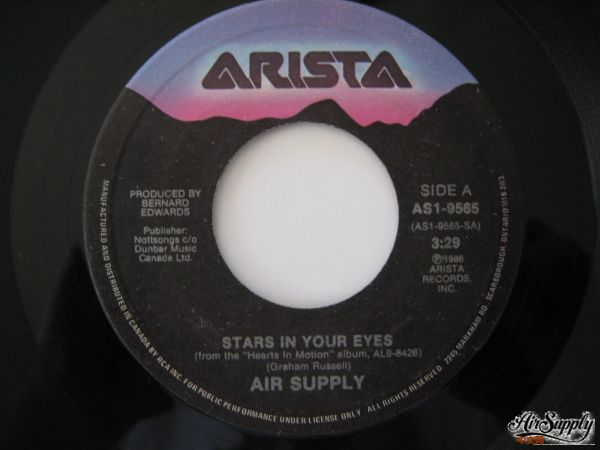
'Stars In Your Eyes' - Canada
Graham got his wish when the third single, ‘Stars In Your Eyes (AS1-9565),’ was released before the end of the year. The song did not chart and was ignored by radio. This was the second last 7" vinyl record that Air Supply released in North America as vinyl was quickly losing ground to Compact Disc (‘The Eyes Of A Child’ in 1987 was the last 7" single). A fourth single from ‘Hearts In Motion,’ ‘It’s Not Too Late,’ was released exclusively in Japan and South America in 1987.
Air Supply maintained a sizable following despite three years of limited success on the charts, and were still very much in demand for television. They appeared on a two-hour ABC special to celebrate Disney World’s 15th Anniversary on November 9, and performed ‘Even The Nights Are Better.’ Russell and Graham were co-hosts for five days on the set of VH-1 during the week of September 22-26. Russell, Paula, Graham and Jodi appeared in a three-part series featuring Air Supply on the short-lived Robin Leach show called Fame, Fortune and Romance.
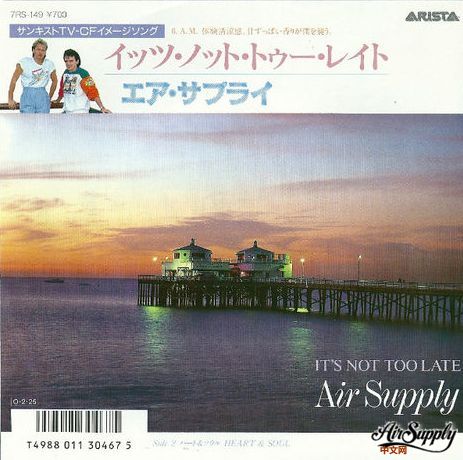
'It's Not Too Late' - Japan Single
Air Supply performed ‘Stars In Your Eyes’ on several television shows, including Solid Gold, The Joan Rivers Show and on the CBS television special, Happy New Year, America, on December 31. The New Years Eve celebration took place at the Waldorf-Astoria in New York City and featured a taped performance from Walt Disney World with Air Supply, Freddie Jackson and Melba Moore. Air Supply shared the stage with live action Disney characters, and performed ‘The One That You Love’ and ‘Stars In Your Eyes’ in front of Cinderella Castle.
Air Supply’s recent lack of radio play scared many concert promoters who questioned the band’s ability to fill a concert hall. Ken Hagerman, a chairman for the Agridome Star Theatre in Regina, Canada, would have hired Air Supply to perform at a city fair but was worried they could not sell enough tickets. The previous year, the fair hired Kenny Rogers to perform but they were hit with huge losses when only half the Agridome was filled. Hagerman felt that Roger’s lack of a recent big hit contributed to the poor turnout. “We learned our lesson,” said Hagerman. “We have to think with our heads and not our hearts. If an act hasn’t done anything in the last year then we can’t afford to take a chance. This is why we turned down Air Supply and Neil Sedaka, who were both available during the fair.” |
|